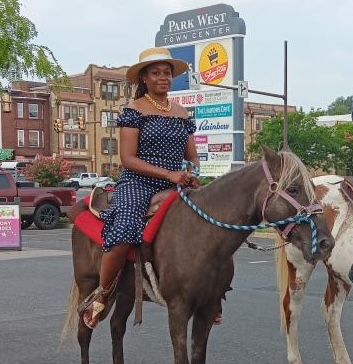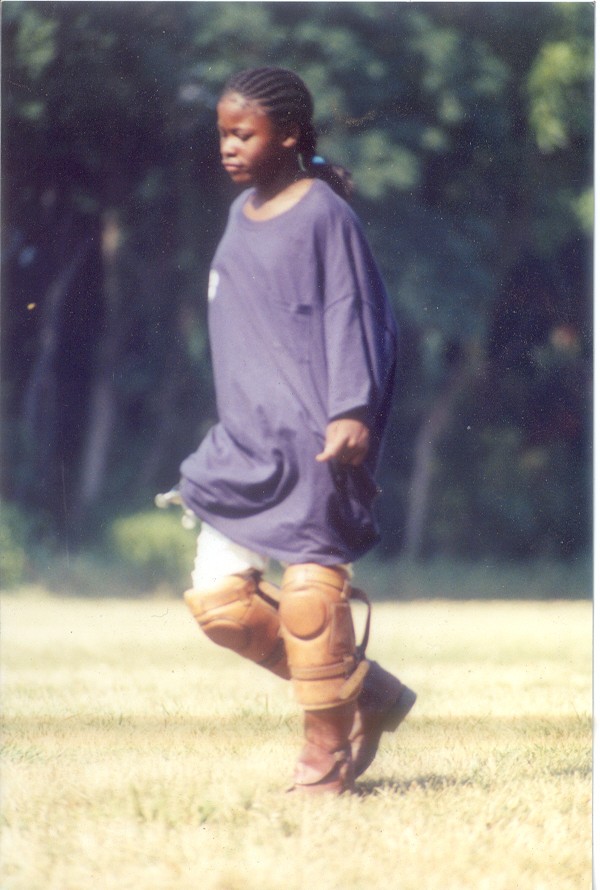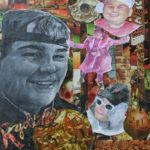
This story was produced as part of our Writing Heals program, in which we hire a family member of the deceased to write the story of the loved one they lost. For more information or to sign up to write about someone you lost to gun violence, click here.
___________________________________________________
By Dr. Shirley Jean Waites-Howard, who knew Mecca and her mother from school
Even at only 8 years old, Mecca Liles Harris was always fearless. She would walk around the stables near Fairmount Park with horses that towered over her.
Instead of fearing them, she fell in love with riding them, joining a long history of urban cowboys and cowgirls of West Philadelphia.
“Mecca showed even more confidence than the bigger boys who were twice her size,” said Donnell “Donnie” Glenn, her friend and horseback trainer in her early days.
Before meeting Donnie, Mecca was so excited when the Brooklyn stable opened near her house. She could hardly wait to get on a horse, said her best childhood friend, Taleah. Even though she didn’t ride, Taleah went with Mecca to visit the stables, and soon she was waving goodbye as Mecca trotted off.

Donnie remembers being surprised at how she could keep up with him when they rode on the trails. Mecca rode a special pony, Halo.
“Mecca enjoyed racing that pony,” Donnie said. “She was quite confident and spunky.”
They organized a Cowboys and Cowgirls Association that organized parties and events for their group. Mecca later participated in the nationally recognized Work-to-Ride Program at Chamonix Equestrian Center in Fairmount Park for horseback and polo training.
Taleah and Mecca were friends who were so close that they were like sisters. Their families moved into neighboring properties at the 4200 block of Aspen Street on Thanksgiving Day in 1997. The families were close, often vacationing together.
Taleah’s mother was Mecca’s godmother, and vice versa. From ages 8 and 9, Mecca and Taleah were inseparable. Even during a year of not speaking due to a silly argument, they still did everything together, even if they didn’t talk.
The two went to Martha Washington Elementary School. Mecca later went on to Walter B. Saul High School, where Mecca specialized in agriculture, animal science and related fields.
Mecca was caring, engaging, funny and loving, Taleah said. She loved all animals and had a gerbil and a dog. She expressed delight in her life, especially with polo and horses.
Mecca was learning how to play polo at the Work to Ride Program. She was even offered a scholarship to attend a polo training program in California, but she did not participate.
“I think Mecca might have become the best female player in the world,” Harvard women’s polo coach Cassie Snow told Philadelphia magazine in 2012. “I have no doubt she would have played for a living.”
She never got the chance.
Mecca, her mother, Sheila Harris, 43, and Daryl Bynum, a 29-year-old man, were found dead in their basement on Oct. 16, 2003. All three had gunshot wounds to the head. Mecca was only 14.
The Mecca’s Life Celebration included a horse-driven carriage carrying her body to Metropolitan Baptist Church. Many of us walked behind the carriage. A huge group of local horsemen attended, and the Urban Cowboys remembered her life annually for many years.
The community was still in shock a few years after another violent event nearby, the “Lex Street Massacre,” in December 2000. Seven people from the same neighborhood, including four children, were killed.
Although it’s been years since Mecca’s passing, Taleah continues to grieve the loss of her special sister. She can’t help but wonder what Mecca would have accomplished in her life.
___________________________________________________
I met Mecca while working as an Administrator for the School District Family Resource Network. I was responsible for support services for students at Martha Washington Elementary School. I was excited to learn of her gifted potential and looked forward to her success.
The opportunity to share her story has been a desire since I learned of her untimely death. The School District of Philadelphia provided emotional support through a core of Black School Psychologists following this trauma to meet with the students.









